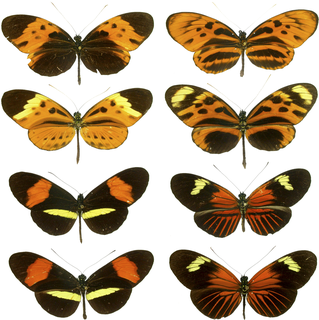
The Heliconiinae, commonly called heliconians or longwings, are a subfamily of the brush-footed butterflies. They can be divided into 45–50 genera and were sometimes treated as a separate family Heliconiidae within the Papilionoidea. The colouration is predominantly reddish and black, and though of varying wing shape, the forewings are always elongated tipwards, hence the common name.

Coliadinae, the sulphurs or yellows, are a subfamily of butterflies with about 300 described species.
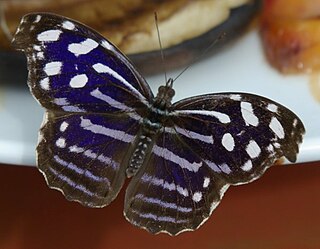
Biblidinae is a subfamily of nymphalid butterflies that includes the tropical brushfoots. This subfamily was sometimes merged within the Limenitidinae, but they are now recognized as quite distinct lineages. In older literature, this subfamily is sometimes called Eurytelinae.

Junonia is a genus of nymphalid butterflies, described by Jacob Hübner in 1819. They are commonly known as buckeyes, pansies or commodores. This genus flies on every continent except Antarctica. The genus contains roughly 30 to 35 species.

Gonepteryx is a genus of butterflies in the family Pieridae. They live in Europe, Asia, and Northern Africa. They are commonly known as brimstones for the bright yellow colour of the wings of most species. These share the same name as the much larger tropical genus Anteos. These inhabit much of central and South America and also North America. This species are known for being the kings of butterfly longevity. 10-13 months is the lifespan for many temperate species. Anteos, however, is much shorter lived. The adults will often mimic Ivy leaves at rest.

Anthene is a genus of butterflies in the family Lycaenidae, commonly called the ciliate blues or hairtails. The genus was erected by Edward Doubleday in 1847.

Oeneis is a butterfly genus of the Satyrinae. All but one of its members are Arctic, sub-Arctic or high-altitude alpine in distribution. Some of the members of the genus are among the butterflies that can get along in the harshest climates of any butterflies. Four species in Europe, more are found in Arctic Russia, Siberia, Mongolia, Arctic North America and the Rocky Mountains. Curiously, there are no observations from Greenland. The development of most species takes two years.

Ithomiini is a butterfly tribe in the nymphalid subfamily Danainae. It is sometimes referred to as the tribe of clearwing butterflies or glasswing butterflies. Some authors consider the group to be a subfamily (Ithomiinae). These butterflies are exclusively Neotropical, found in humid forests from sea level to 3000 m, from Mexico to Argentina. There are around 370 species in some 40–45 genera.

Callicore is a genus of nymphalid butterfly found in the Neotropical realm. This genus, like some related ones, was formerly lumped together as the paraphyletic Catagramma assemblage.

Manulea is a genus of moths in the family Erebidae erected by Hans Daniel Johan Wallengren in 1863. The type species is Lithosia gilveola Ochsenheimer, 1810.
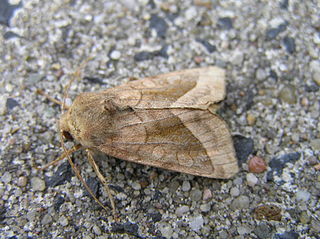
Hydraecia is a genus of moths of the family Noctuidae.

Adelpha is a genus of brush-footed butterflies found from the southern United States and Mexico to South America. They are commonly known as sisters, due to the white markings on their wings, which resemble a nun's habit. This genus is sometimes included with the admiral butterflies (Limenitis).

Argynnis is a genus of butterflies in the family Nymphalidae, one of several groups known as "fritillaries". Its species are commonly found in Europe and Asia.

Athesis is a Neotropical genus of clearwing (ithomiine) butterflies, named by Edward Doubleday in 1847. They are in the brush-footed butterfly family, Nymphalidae.

Hypothyris is a genus of clearwing (ithomiine) butterflies, named by Jacob Hübner in 1821. They are in the brush-footed butterfly family, Nymphalidae.
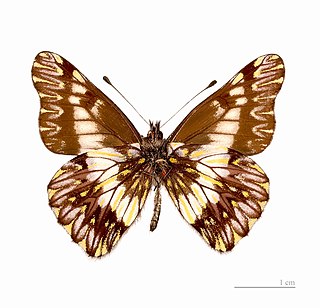
Catasticta is a genus of Neotropical butterflies in the family Pieridae. The genus was erected by Arthur Gardiner Butler in 1870.
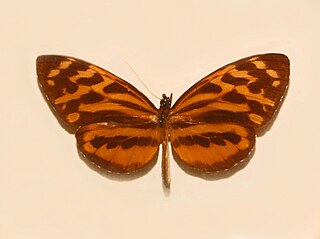
Tithorea is a Neotropical genus of butterflies belonging to the family Nymphalidae. The genus was erected by Henry Doubleday in 1847.

Thyridia is a monotypic genus of clearwing (ithomiine) butterflies, named by Jacob Hübner in 1816. Its only species is Thyridia psidii, the Melantho tigerwing or clapping ticlear. It is in the brush-footed butterfly family, Nymphalidae and is found in the Neotropical zone.
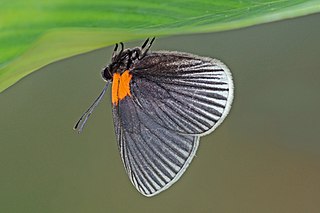
Euselasiinae is a subfamily of Riodinidae. The species are confined to the Neotropical realm.
Cadphises is a genus of moths belonging to the family Zygaenidae.


















